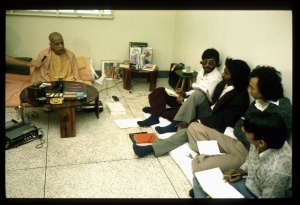SB 3.26.71

A.C. Bhaktivedanta Swami Prabhupada
TEXT 71
yathā prasuptaṁ puruṣaṁ
prāṇendriya-mano-dhiyaḥ
prabhavanti vinā yena
notthāpayitum ojasā
SYNONYMS
yathā—just as; prasuptam—sleeping; puruṣam—a man; prāṇa—the vital air; indriya—the senses for working and recording knowledge; manaḥ—the mind; dhiyaḥ—the intelligence; prabhavanti—are able; vinā—without; yena—whom (the Supersoul); na—not; utthāpayitum—to arouse; ojasā—by their own power.
TRANSLATION
When a man is sleeping, all his material assets—namely the vital energy, the senses for recording knowledge, the senses for working, the mind and the intelligence—cannot arouse him. He can be aroused only when the Supersoul helps him.
PURPORT
The explanation of Sāṅkhya philosophy is described here in detail in the sense that the virāṭ-puruṣa, or the universal form of the Supreme Personality of Godhead, is the original source of all the various sense organs and their presiding deities. The relationship between the virāṭ-puruṣa and the presiding deities or the living entities is so intricate that simply by exercising the sense organs, which are related to their presiding deities, the virāṭ-puruṣa cannot be aroused. It is not possible to arouse the virāṭ-puruṣa or to link with the Supreme Absolute Personality of Godhead by material activities. Only by devotional service and detachment can one perform the process of linking with the Absolute.